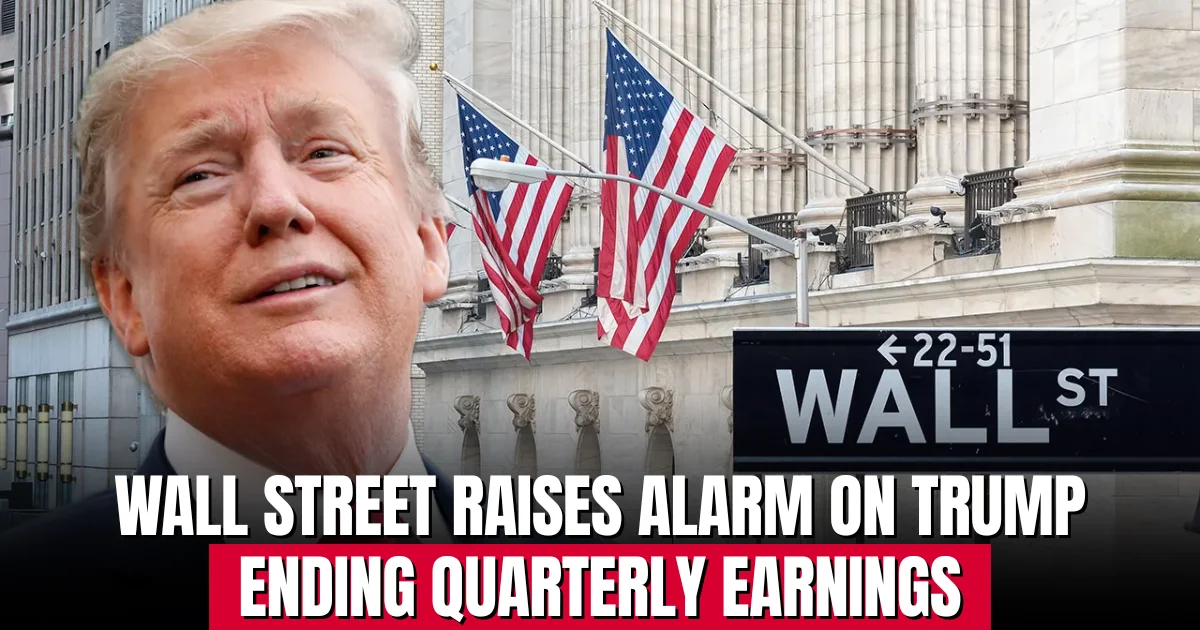Trump’s call to replace quarterly earnings with semiannual reports sparks Wall Street backlash over transparency, volatility, and investor confidence.
Table of Contents
Wall Street Raises Alarm on Trump Ending Quarterly Earnings
For more than 50 years, U.S. companies have reported earnings every three months, giving investors and regulators a consistent window into financial health and performance. But President Donald Trump has reignited the debate, proposing to end quarterly earnings reports in favor of a six-month schedule.
The move, Trump argues, would cut costs and allow managers to focus on building long-term strategies rather than chasing short-term targets. Yet, Wall Street leaders warn the shift could have profound implications for transparency, accountability, and market volatility.
Trump’s Push for Semiannual Reporting

In a wave of early-morning social media posts, Trump called quarterly reports a distraction from effective corporate management. He suggested a six-month cycle would free up executives’ time and resources while reducing the expenses tied to frequent financial disclosures.
This isn’t the first time Trump has floated the idea. Back in 2018, he signaled support for a semiannual system after discussions with top business leaders.
Why Wall Street Is Concerned

Analysts and strategists across the financial sector have voiced caution, highlighting risks of greater uncertainty, larger earnings surprises, and increased market swings.
- Transparency at Risk: Jonathan Golub of Seaport Research Partners argued that capital markets work best with more frequent disclosures, not less.
- Volatility Fears: Wells Fargo’s Sameer Samana warned that fewer reports could trigger sharper market reactions, leading to price volatility.
- Loss of Investor Dialogue: Kim Forrest of Bokeh Capital Partners noted that quarterly earnings calls give investors valuable insights into company operations. Eliminating them would weaken shareholder communication.
- Legal Hurdles: Ed Mills of Raymond James pointed out that quarterly reporting is rooted in federal law, making a complete overhaul unlikely without congressional approval.
Supporters See Benefits for Long-Term Strategy
Not all voices are opposed. Some analysts believe the change could help companies prioritize long-term growth over short-term market expectations.
- Reduced Pressure: Irene Tunkel of BCA Research argued quarterly results have become more about “gaming expectations” than providing real insights. A longer cycle could ease this pressure.
- Lower Costs: Reporting less frequently would cut compliance expenses, which some experts say could encourage more companies to go public.
- Focus on Innovation: By shifting away from constant earnings pressure, firms may gain room to invest in research, strategy, and innovation.
The SEC’s Role and Possible Next Steps
The Securities and Exchange Commission (SEC) mandated quarterly reporting in 1970 to restore trust after the 1929 stock market crash.
TD Cowen analyst Jaret Seiberg now sees a 60% chance that the SEC will seriously consider Trump’s proposal. Still, any change would require extensive rulemaking, public input, and economic analysis to survive judicial review.
Conclusion
Trump’s push to end quarterly earnings has reopened one of Wall Street’s most contentious debates. While proponents believe it would reduce costs and short-termism, critics fear the move could undermine transparency, increase volatility, and erode investor confidence.
The SEC’s response — and whether Congress steps in — will determine whether this decades-old reporting system survives or shifts toward Trump’s proposed six-month model.
FAQs
Q1. Why does Trump want to end quarterly earnings reports?
Trump argues that semiannual reporting would save money and allow executives to focus on long-term business strategies rather than quarterly targets.
Q2. What are Wall Street’s concerns about ending quarterly reporting?
Analysts warn that reducing reporting frequency could increase market volatility, limit transparency, and hurt investor confidence.
Q3. Has this idea been proposed before?
Yes. Trump raised the same issue in 2018 after consulting with top CEOs, saying the change could benefit corporate America.
Q4. Can the SEC legally end quarterly earnings?
Quarterly reporting is currently mandated under U.S. law. The SEC may adjust requirements, but Congress would likely need to act for a full repeal.
Q5. How would ending quarterly reports affect investors?
Investors would receive less frequent updates on company performance, making it harder to evaluate businesses in real time and potentially leading to sharper stock moves.

